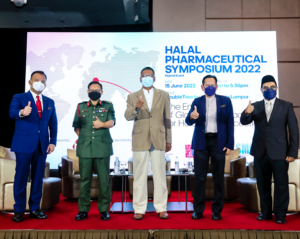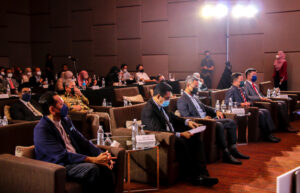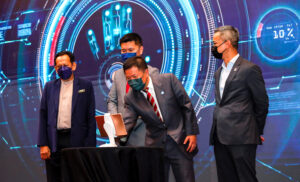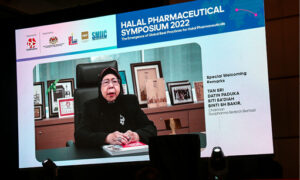Employing high standards in halal pharmaceuticals can help capture a larger share of the global halal market
The halal pharmaceutical sector is starting to receive recognition from the mainstream pharmaceutical industry, and this scenario has fuelled further revenue growth in this potential area.
According to the State of Global Islamic Economy 2022 Report, the halal pharmaceutical market increased by 6.5 per cent in 2021, from US$93.5 billion to US$100 billion. The market is expected to expand by 6.7 per cent in 2022 to US$106 billion before reaching US$129 billion in 2025 at a 4-year compound annual growth rate (CAGR) of 6.7 per cent.
As part of its continuing quest to spearhead efforts in capturing the global halal pharmaceutical market, Duopharma Biotech Berhad organised the 3rd Halal Pharmaceuticals Symposium on June 15, with the theme “The Emergence of Global Best Practices for Halal Pharmaceuticals”.

During the symposium, a panel discussion entitled “Global Halal Pharmaceuticals Industry Best Practices” was held, featuring Dr Mohammed Ali AlSheikh Wace, Assistant Specialist of the Standards and Metrology Institute for Islamic Countries (SMIIC), Mohd Fakarudin Masod, Principal Assistant Director, Halal Management Division, Department of Islamic Development Malaysia (JAKIM) and Wan Amir-Jeffery Wan Abdul Majid, Chief Operating Officer of Duopharma Biotech Berhad. The session was moderated by Dr Mazlina Mohd Said, Senior Lecturer, Faculty of Pharmacy, Universiti Kebangsaan Malaysia (UKM).
Touching on the history of halal certification for Malaysia’s pharmaceutical sector, Mohd Fakarudin said the quest was quite challenging for the authority as the pharmaceutical industry is highly regulated.
“We were working closely with the Ministry of Health (MoH), and during that time, they allowed us to certify products without using any halal logo. Alhamdulillah, after we launched the MS 2424:2019, the MoH and National Pharmaceutical Regulatory Agency (NPRA) allowed us to certify another category of products, especially for prescribed medicines.”
Dr Mohammed Ali mentioned that MS 2424 was used as part of the reference in developing SMIIC documents for halal pharmaceutical issues.
He said: “We have many challenges to harmonise halal issues because we have different views on some fiqh issues among the Organisation of Islamic Cooperation (OIC) countries. We cooperate with the International Islamic Fiqh Academy to avoid any problems.”
Duopharma Biotech’s GMP Plus
According to Wan Amir-Jeffery, Duopharma Biotech takes halal pharmaceuticals very seriously, and the company has also set up its halal committee.
“Halal is not an afterthought. It was something that we found to be an element beyond Good Manufacturing Practice (GMP) that was very important to us. We term it GMP Plus.”

He said at the early stage, the company applied to get halal certification for some of its consumer healthcare products under the food standard of MS 1500. Subsequently, the company looked at how it could improve the whole process of decontamination in the context of ‘sertu’.
“That was what we did in 2008, and 2012 was when we had the standard for the supplements, so we registered. We were keen to become the first company to register our first product to get the halal certification.
“We saw it as a differentiator. We believe there was value in halal pharmaceuticals, not just primarily for the Muslims, but also the non-Muslims,” shared Wan Amir-Jeffery, adding that the company hoped to get the halal certification for its biosimilar products.
A robust halal pharmaceutical industry
The topic for the second panel discussion of the symposium was “Halal Pharmaceuticals – Impact on the Global Healthcare System and Sustainability”.
It featured panellists – Brigadier General Dato’ Dr A. Halim Basari, Inspector General, Malaysian Armed Forces Health Services (MAFHS), Dato’ Muhammad Lukmani Ibrahim, Subject Matter Expert on Halal Pharmaceuticals & Convener for TC16/ WG1, SMIIC, Amrahi Buang, President of Malaysian Pharmacists Society (MPS) and Prof Dr Syed Azhar Syed Sulaiman, Senior Professor in Clinical Pharmacy, School of Pharmaceutical Sciences, University Sains Malaysia (USM). The session was moderated by Azman Zakaria, CEO of IPEC Berau.
Muhammad Lukmani said: “In 2012, the Malaysian National Medicines Policy recognised halal pharmaceuticals. It was mentioned in the policy that we must work with relevant authorities to provide the accessibility for Malaysians to have halal medicine.”
He then shared his experience in leading the working group committee at SMIIC. He said most of the experts in the working group have technical backgrounds in food. Therefore, they had to properly align their thoughts and understand MS 2424 to develop the SMIIC standard for halal pharmaceuticals.
“If you ask me whether we have achieved the milestone in developing the standard, then yes, we have achieved that. Because at the end of the day there was consensus among the technical experts and finally now, it (the SMIIC standard) is at the final stage of balloting, and is based on the Malaysian standard.”
Sharing the halal pharmaceutical journey at MAFHS, A. Halim stated they had unique clients who demanded the best pharmacotherapy and halal medicines. The organisation then worked with multiple stakeholders to manage the procurement of halal medicines.
“We boldly change our procurement policy and pharmacy practises into a Shariah-compliant system to buy them. We then published the first halal medicines formulary, where we differentiated medicines into three categories: red being porcine-based (non-halal), green as halal, and grey as mushbooh (unclear). “
He shared that Malaysia had one of the most robust halal pharmaceuticals industries in the world and is championing halal medicines globally.
Emphasising on ethics
Syed Azhar, talking from the academician’s point of view, emphasised the quality of life.
“The research we have been doing is not just focusing on what the vaccine is all about, etc. We are talking about specifically the quality of life,” he said, adding that halal pharmaceuticals are essential in supplying quality treatments for patients.
Amrahi shared that MPS, a professional body representing Malaysian pharmacists, established the halal pharmaceutical chapter under the council in 2014.
“Halal is for all. Halal, toyyiban and ethics must come into the picture. We want to develop these things because pharmacist practitioners deal directly with patients and fellow professionals. MPS plays a huge role in this initiative.
“It is crucial for the professional body to take this responsibility. From there on, we were able to move, be involved in policies, discuss the national medicine policies, and participate in making standards like MS 2424 and MS 2636,” explained Amrahi. — The Health
Stewarding knowledge management in halal

Duopharma Biotech Berhad has organised the International Halal Pharmaceutical Symposium since 2016 to reinforce the true meaning of halal pharmaceuticals. The company consistently works to ensure that the industry supply chain follows rigorous international halal standards to produce high-quality products at every stage of the value chain.
The 3rd edition of the symposium on June 15 witnessed the launching ceremony of the Halal Pharmapreneur Professional Certificate Programme by Universiti Kebangsaan Malaysia (UKM). The Faculty of Pharmacy of UKM, in collaboration with the Malaysian Pharmacists Society (MPS) and Duopharma Biotech, is offering a new programme to spearhead the halal and Shariah-compliant entrepreneurship concept in community pharmacy businesses.

“Duopharma Biotech has strived to establish strategic collaborations to meet the demands of the Malaysian, ASEAN and global markets. We will continue taking the necessary measures to grow the halal pharmaceutical industry in Malaysia and worldwide. We remain committed to our aspiration to produce safe, effective, quality and halal products for all consumers,” said Tan Sri Siti Sa’diah Sh Bakir, Chairman of Duopharma Biotech, during her welcoming remarks.
“Another pivotal factor in the growth of the halal pharma industry is the effort to steward knowledge management which relates to people and talent development. Continuous human capital and knowledge development are imperatives in the development of any industry.
“Technological advancement and innovation in products, and increasingly agile services will continuously challenge halal standards and procedures to intentionally remain “in step and fit for purpose”. Collaboration with UKM on development of Professional Certificate Halal Pharmapreneur which is open to all professional pharmacists who wish to develop their knowledge is encouraged,” she said.
The Halal Pharmapreneur Professional Certificate Programme provides guidance and training on the fundamental skills needed in halal pharmapreneurship. These include understanding halal and toyyiban, halal science, halal assurance system, drug monitoring services, halal-based community pharmacy services and the halal-centric business aspects of being a community pharmacist. — The Health








